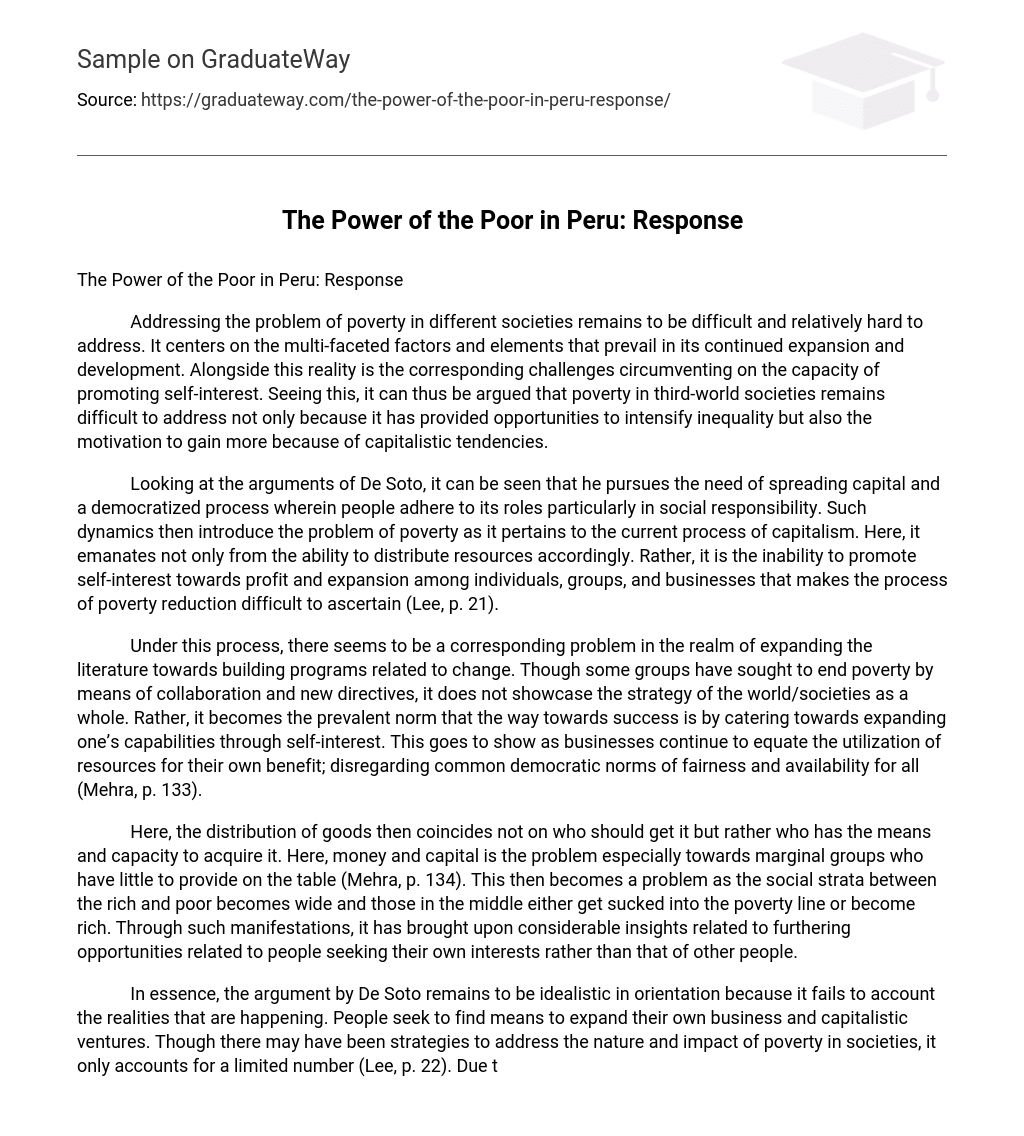Addressing the problem of poverty in different societies remains to be difficult and relatively hard to address. It centers on the multi-faceted factors and elements that prevail in its continued expansion and development. Alongside this reality is the corresponding challenges circumventing on the capacity of promoting self-interest. Seeing this, it can thus be argued that poverty in third-world societies remains difficult to address not only because it has provided opportunities to intensify inequality but also the motivation to gain more because of capitalistic tendencies.
Looking at the arguments of De Soto, it can be seen that he pursues the need of spreading capital and a democratized process wherein people adhere to its roles particularly in social responsibility. Such dynamics then introduce the problem of poverty as it pertains to the current process of capitalism. Here, it emanates not only from the ability to distribute resources accordingly. Rather, it is the inability to promote self-interest towards profit and expansion among individuals, groups, and businesses that makes the process of poverty reduction difficult to ascertain (Lee, p. 21).
Under this process, there seems to be a corresponding problem in the realm of expanding the literature towards building programs related to change. Though some groups have sought to end poverty by means of collaboration and new directives, it does not showcase the strategy of the world/societies as a whole. Rather, it becomes the prevalent norm that the way towards success is by catering towards expanding one’s capabilities through self-interest. This goes to show as businesses continue to equate the utilization of resources for their own benefit; disregarding common democratic norms of fairness and availability for all (Mehra, p. 133).
Here, the distribution of goods then coincides not on who should get it but rather who has the means and capacity to acquire it. Here, money and capital is the problem especially towards marginal groups who have little to provide on the table (Mehra, p. 134). This then becomes a problem as the social strata between the rich and poor becomes wide and those in the middle either get sucked into the poverty line or become rich. Through such manifestations, it has brought upon considerable insights related to furthering opportunities related to people seeking their own interests rather than that of other people.
In essence, the argument by De Soto remains to be idealistic in orientation because it fails to account the realities that are happening. People seek to find means to expand their own business and capitalistic ventures. Though there may have been strategies to address the nature and impact of poverty in societies, it only accounts for a limited number (Lee, p. 22). Due to this, extracting cooperation towards poverty-reduction initiatives may prove to be difficult not only because of its tendency to defeat an individualistic purpose but also De Soto’s argument does not seek to ascertain what strategies and mindset are essential to change this mindset among individuals, groups, and businesses.
In the end, the argument of De Soto may prove to be incomplete in pointing out what needs to be done in addressing poverty. It fails to address the innate ability of man to pursue their self-interests and justify its existence in every capitalistic/business endeavor. By seeking to outline its existence and highlight its relevance within societies, groups and organizations can then necessitate a mindset not only on addressing the problem but also create better means to infuse the validity of interests plays within the scope of social relations and development.
Works Cited
Lee, Dwight. The Politics of Poverty and the Poverty of Politics. Cato Journal. 1985, 5(1)
accessed 3 May 2010 from <http://www.cato.org/pubs/journal/cj5n1/cj5n1-2.pdf> pp.17-35
Mehra, Madhav. Tackling Poverty Issues Makes Businesses Prosperous: Making Money While
Making a Difference. accessed 3 May 2010 from <http://www.wcfcg.net/gcsr_proceedings/Dr%20Madhav%20Mehra.pdf> pp. 130-135





